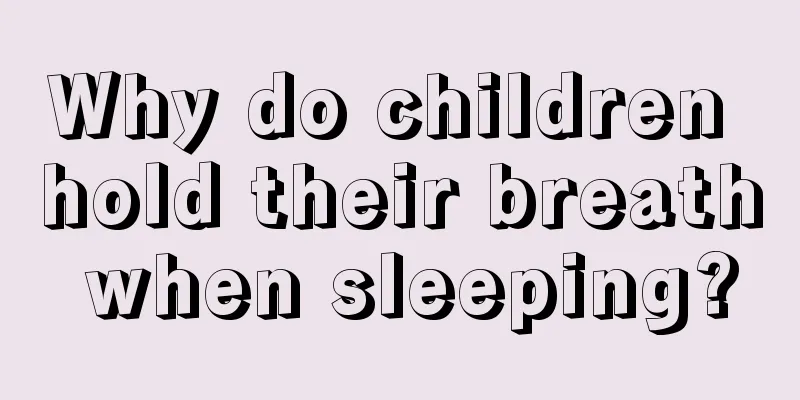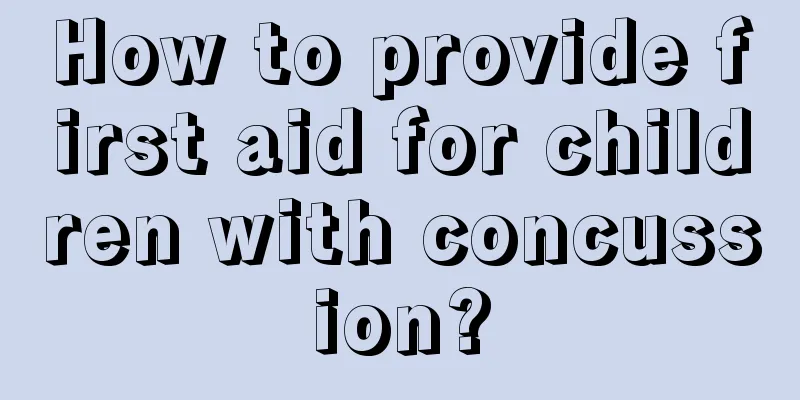Why do children hold their breath when sleeping?

|
Nowadays, most families have only one child, and children are the center of the family. Generally, children are taken care of by their parents, and their children’s health is what their parents care about most. Some careful parents found that their children were holding their breath when they were sleeping, and they became very worried. So what happens if children hold their breath while sleeping? And what should we do? The baby's tonsils are enlarged or the tongue naturally droops due to the influence of gravity when sleeping on the back, pressing on the respiratory tract, causing breathing difficulties. Simply put, this is also the cause of snoring in adults. Children spend about two-fifths of their time sleeping, and growth hormone, which promotes children's growth and development, is mainly secreted during deep sleep at night. Therefore, good and sufficient sleep is a basic condition for the growth and development of the brain and body. A snoring baby may appear to be sleeping soundly, but snoring is actually a manifestation of breathing disorder. When these children grow up, their chances of developing high blood pressure, heart disease, stroke and other diseases will be greatly increased. Children's snoring accompanied by apnea and hypopnea can cause brain hypoxia, which in mild cases can lead to children's inattention in class, poor memory, and poor overall development and nutritional status. Severe snoring can cause otitis media with effusion, affecting children's hearing; it can also cause heart and lung diseases in children and sudden death due to apnea during sleep. Children's snoring during sleep is mainly caused by enlarged adenoids and tonsils. According to the law of growth and development, after the baby is 2 years old, the tonsils and adenoids will grow larger, reach their largest size when they are 5-6 years old, gradually shrink after the age of 12, and atrophy during puberty. However, if the upper airway inflammation recurs, it may cause the tonsils and adenoids to hypertrophy beyond the physiological level. As the child's muscles relax after falling asleep, the swollen glands will block the airway, causing the upper airway to narrow or collapse, making it difficult for the child to breathe, causing snoring, or even shortness of breath. Regarding the question of why children hold their breath when they sleep, I think I have explained it in great detail, and I believe that parents and friends will also understand it well. If you find that your child is holding his breath while sleeping, you must see a doctor immediately and seek the most effective help to deal with the problem in a timely manner, which will be of the greatest benefit to your child's health. |
<<: What is going on when my child keeps having a fever?
>>: What is in the appetizer tea for toddlers?
Recommend
What should we do to help children digest food and stimulate their appetite?
In addition to being prone to fever and colds, ch...
What kind of nutritious breakfast should children eat?
Childhood is a period of rapid growth and develop...
What should I do if my child has a bloated stomach? Teach you simple home care methods
Abdominal bloating is a common symptom in childre...
What to do if your child has a stuffy nose
Children will encounter various diseases as they ...
Why does a two-year-old baby sneeze and have a runny nose?
If a two-year-old baby sneezes and has a runny no...
What to do if your child has a persistent cough and high fever
If a child coughs and has a high fever, parents m...
What should I do if my five-month-old baby has not defecated for three days?
As a pediatric medical worker, I have to answer m...
What should I do if my child has gastritis?
Nowadays, the number of children with gastritis i...
What should I do if my child coughs and has eye mucus?
In daily life, children will cough from time to t...
How to judge whether the baby's fontanelle is cold
Many parents have questions about how to determin...
Reasons why children don't grow taller
The growth status of children is different in eac...
What happens when a child's new teeth grow out but the old teeth do not fall out?
The most impressive thing about children in the p...
What are the symptoms of indigestion in children?
If a child has indigestion, he or she should avoi...
What should I do if my baby is allergic to medicine?
If newborn babies are not adapted, they may get s...
Which department should children with ADHD go to?
Attention deficit hyperactivity disorder (ADHD) i...









